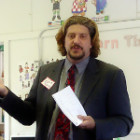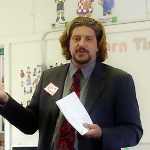 Her: “The kids would miss feeling like they’re part of it.”
Her: “The kids would miss feeling like they’re part of it.”
Me: “But they’re not part of it. We’re lying to them. It’s dishonest.”
This was part of the discussion at a recent Board of Directors meeting for a local Little League. At issue: current league rules in which the players vote for the “all-star” team, and top vote-getters form the ballot from which the managers decide the final twelve players.
However, unbeknownst to the kids, the managers can add anyone to the ballot that they think the kids forgot. And they usually do.
I am the idealistic league president, passionately arguing that, in the current scenario, the kids’ votes essentially mean nothing. The managers add anyone to the ballot that they want; the ones they would not have placed there they don’t vote for anyway.
So, I’ve made a proposal: drop the sham, and just let the managers pick the all-star teams. Stop telling the youth that their voice matters in the All-Star vote when, in the end, it doesn’t.
I’m startled by the uproar, the outrage. How dare I suggest we take this counterfeit sacred ritual away from the kids?
My response is that the moment we consciously strip honesty and integrity away from processes involving youth, we start down the slippery slope that leads to autocratic and monolithic systems. In a utilitarian, Ayn Rand-inspired world, these systems work … but are they right?
Here is an intuitive thought from the playbook of youth development philosophy: Children and youth should be treated as human beings, not as objects to manipulate within a system.
Too many times, we educators marginalize the thoughts and feelings of the children and youth we serve and fail to provide them with opportunities to make meaningful choices. The American system of education has been set up as an adult-driven, top-down model. Practices and procedures have been engineered and optimized primarily to facilitate the needs and ease of the teacher, the school and the system, not the student.
On reflection, it’s easy to see why we’ve set it up this way: One teacher must facilitate many students; our system must hold the diverse population of children and youth to a single standard. The easiest way to achieve success in that type of system is to drive it from the top-down. Sure, some kids may “shake out” through the process and fall through the cracks, but as long as the majority makes it through the cookie-cutter, we’ve done our job, and the rest can be chalked up in the “acceptable losses” column.
To keep inner idealists fooled, we talk of “differentiated teaching” and varied “learning styles,” but in the end, most teachers find it’s a Herculean task when faced with growing class sizes yoked ironically with a reduction in classroom help. And so they do the best they can — and sometimes they feel the easiest way to maintain integrity in the classroom is to tighten controls on the reins of power — but at that point, the integrity being served is only that of the system – not the integrity of our educational interaction with students.
With the recent advancement of after-school “expanded learning” initiatives, we’re starting to see this cookie cutter approach encroaching in the world of Out-of-School Time (OST). OST now faces its first existential battle: continue with its traditional youth development principles or capitulate to the adult-driven system of the stronger, better-organized education establishment.
OST practitioners and theorists have spent decades building the foundation for child-driven pedagogy and practice in the afterschool program. They know it works, as it has become the flexible counterbalance to a rigid school day. OST has blossomed into the Yin of Informal Learning, a Zen opposite to the school system’s Formal Learning Yang.
When we engage children and youth in a way that doesn’t just pay lip service to — but actually shows them — that their viewpoint is primary to the learning process, we create education with a basis in integrity. OST has built a strong foundation in the world of child-driven learning, and it would be a mistake to give up on that principle to maintain parity with the school systems who are now beginning a slow encroachment on Out-of-School Time.
Rick Rood is a 25-year front-line veteran of the Out-of-School-Time profession and author of the book Games Teachers Play Before the Bell Rings.






























